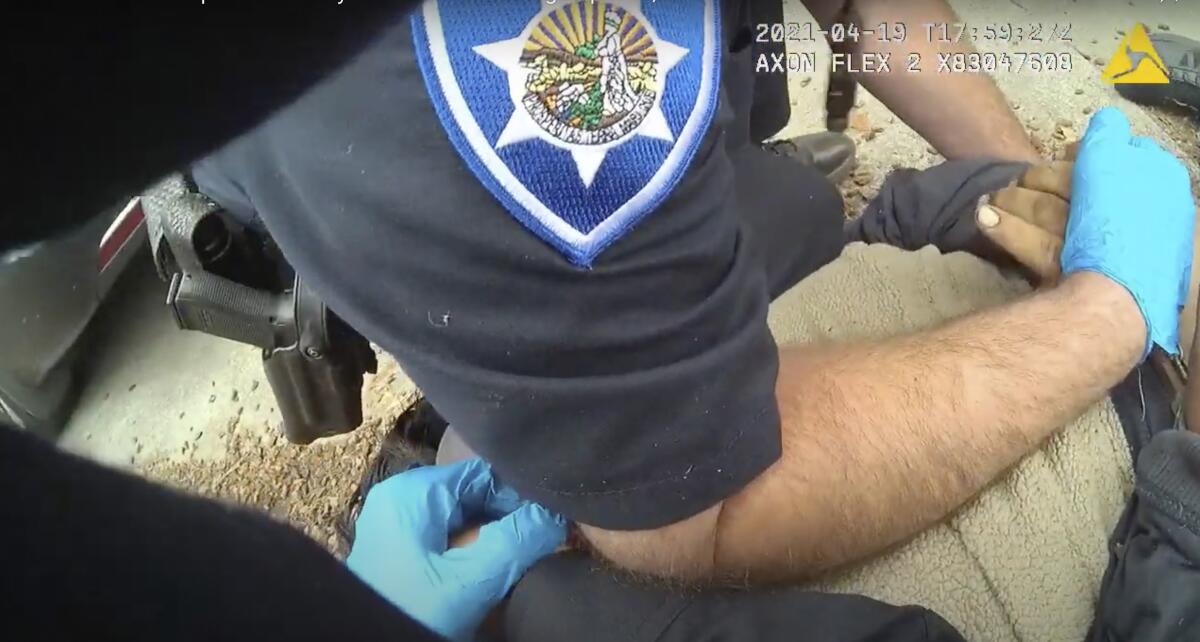Family wants federal inquiry of Alameda police in death of Mario Gonzalez

- Share via
Attorneys for the family of Mario Gonzalez, a Latino man who died after an Alameda officer put a knee on his back and neck for more than four minutes, are asking the U.S. attorney general to conduct a federal civil rights investigation of the Bay Area city’s police department.
Julia Sherwin and Michael Haddad, who represent the 26-year-old’s mother, brothers and 4-year-old son, sent a letter to Atty. Gen. Merrick Garland asking him to initiate a civil rights inquiry into Gonzalez’s death and the policies and training of the Alameda Police Department, noting this is the second such death involving the department in recent years.
For the record:
10:59 p.m. May 11, 2021A previous version of this article misspelled attorney Julia Sherwin’s first name as Julie.
“Mario died as a result of the officers’ prone weight restraint on him,” Sherwin wrote in the letter sent Monday to Garland.
A similar death occurred in December 2018, Sherwin wrote. Shelby Gattenby, an Iraq war veteran, died while being detained by Alameda police after they pinned him in a prone position and used a stun gun on him multiple times.
She said the department should have revised its policies and training after that incident: “If they had done that, Mario would still be alive.”
Experts express concerns about video of an Alameda police officer appearing to put a knee on the back of a Latino man as he gasped for breath and died.
Before Gonzalez died, Alameda police were sent to a park April 19 in response to calls about an intoxicated man and a possible theft. One of the 911 callers told a dispatcher: “He seems like he’s tweaking. But he’s not doing anything wrong; he’s just scaring my wife.”
A second caller told a dispatcher about a man with a Walgreens basket with alcohol and said, “It looks like he is breaking off the security tags.” That caller added that the man had been loitering for half an hour.
When police arrived, Gonzalez would not produce any identification, so the officers tried to force his hands behind his back to handcuff him, but he would not let his arms go limp. The officers determined that he was resisting, then pushed him to the ground, according to video from their body cameras.
In the nearly hourlong body-camera video (caution: graphic content), Gonzalez appeared to be disoriented or drunk, looking dazed and struggling to answer officers’ questions.
As they sought to restrain him, the officers repeatedly asked Gonzalez for his full name and birth date. “We’re going to take care of you, OK. We’re going to take care of you,” one officer told him. “I think you just had too much to drink today, OK? That’s all.” After learning his name, the officer added, “Mario, just please stop fighting us.”
Gonzalez, who weighed about 250 pounds, was lying face-down on some wood chips and was heard shouting and grunting as the officers used their body weight to control him. One officer seemed to put an elbow on his neck and a knee on his shoulder.
Gonzalez can be heard in the video telling officers, “I didn’t do nothing, OK?”
When Gonzalez stopped breathing, the officers rolled him over onto his back and performed cardiopulmonary resuscitation, but he was pronounced dead at a hospital.
It’s a video that has drawn comparison to that of the George Floyd killing.
Gonzalez’s death generated widespread outrage and comparisons to the murder of George Floyd by a Minneapolis police officer.
The cause of death is still under investigation, and the medical examiner of the Alameda County Sheriff’s Office has convened a peer group to review the autopsy before releasing its findings. But several experts in police training have said Gonzalez could have been asphyxiated by the weight the officers placed on him.
Seth Stoughton, a University of South Carolina law professor and former Florida police officer, said “the dangers of positional asphyxia” have been well known in policing and incorporated into training since the early 1990s.
The technique of pinning a suspect to the ground should especially be avoided when there are risk factors, such as obesity or drug or alcohol use, as was true in the Alameda case, Stoughton said.
He likened the situation to a boa constrictor killing its prey by depriving it of oxygen.

Gonzalez’s death is also under investigation by the Alameda County Sheriff’s Office and the county district attorney’s office. The city of Alameda has identified the three officers placed on leave during the investigation into Gonzalez’s death as James Fisher, Cameron Leahy and Eric McKinley.
At a special session of the Alameda City Council on Saturday, members approved a plan to divert some 911 calls for mental health checks to the Fire Department or a community health team. They also explored the creation of a civilian police auditor and a ballot measure that would create a civilian police oversight panel.
More to Read
Sign up for Essential California
The most important California stories and recommendations in your inbox every morning.
You may occasionally receive promotional content from the Los Angeles Times.
















